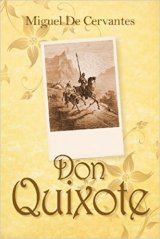Don Quixote Page #20
The Ingenious Nobleman Sir Quixote of La Mancha, or just Don Quixote, is a Spanish novel by Miguel de Cervantes.
The goatherd had hardly done speaking, when the notes of the rebeck reached their ears; and shortly after, the player came up, a very good-looking young man of about two-and-twenty. His comrades asked him if he had supped, and on his replying that he had, he who had already made the offer said to him: "In that case, Antonio, thou mayest as well do us the pleasure of singing a little, that the gentleman, our guest, may see that even in the mountains and woods there are musicians: we have told him of thy accomplishments, and we want thee to show them and prove that we say true; so, as thou livest, pray sit down and sing that ballad about thy love that thy uncle the prebendary made thee, and that was so much liked in the town." "With all my heart," said the young man, and without waiting for more pressing he seated himself on the trunk of a felled oak, and tuning his rebeck, presently began to sing to these words. ANTONIO'S BALLAD Thou dost love me well, Olalla; Well I know it, even though Love's mute tongues, thine eyes, have never By their glances told me so. For I know my love thou knowest, Therefore thine to claim I dare: Once it ceases to be secret, Love need never feel despair. True it is, Olalla, sometimes Thou hast all too plainly shown That thy heart is brass in hardness, And thy snowy bosom stone. Yet for all that, in thy coyness, And thy fickle fits between, Hope is there--at least the border Of her garment may be seen. Lures to faith are they, those glimpses, And to faith in thee I hold; Kindness cannot make it stronger, Coldness cannot make it cold. If it be that love is gentle, In thy gentleness I see Something holding out assurance To the hope of winning thee. If it be that in devotion Lies a power hearts to move, That which every day I show thee, Helpful to my suit should prove. Many a time thou must have noticed-- If to notice thou dost care-- How I go about on Monday Dressed in all my Sunday wear. Love's eyes love to look on brightness; Love loves what is gaily drest; Sunday, Monday, all I care is Thou shouldst see me in my best. No account I make of dances, Or of strains that pleased thee so, Keeping thee awake from midnight Till the cocks began to crow; Or of how I roundly swore it That there's none so fair as thou; True it is, but as I said it, By the girls I'm hated now. For Teresa of the hillside At my praise of thee was sore; Said, "You think you love an angel; It's a monkey you adore; "Caught by all her glittering trinkets, And her borrowed braids of hair, And a host of made-up beauties That would Love himself ensnare." 'T was a lie, and so I told her, And her cousin at the word Gave me his defiance for it; And what followed thou hast heard. Mine is no high-flown affection, Mine no passion par amours-- As they call it--what I offer Is an honest love, and pure. Cunning cords the holy Church has, Cords of softest silk they be; Put thy neck beneath the yoke, dear; Mine will follow, thou wilt see. Else--and once for all I swear it By the saint of most renown-- If I ever quit the mountains, 'T will be in a friar's gown. Here the goatherd brought his song to an end, and though Don Quixote entreated him to sing more, Sancho had no mind that way, being more inclined for sleep than for listening to songs; so said he to his master, "Your worship will do well to settle at once where you mean to pass the night, for the labour these good men are at all day does not allow them to spend the night in singing." "I understand thee, Sancho," replied Don Quixote; "I perceive clearly that those visits to the wine-skin demand compensation in sleep rather than in music." "It's sweet to us all, blessed be God," said Sancho. "I do not deny it," replied Don Quixote; "but settle thyself where thou wilt; those of my calling are more becomingly employed in watching than in sleeping; still it would be as well if thou wert to dress this ear for me again, for it is giving me more pain than it need." Sancho did as he bade him, but one of the goatherds, seeing the wound, told him not to be uneasy, as he would apply a remedy with which it would be soon healed; and gathering some leaves of rosemary, of which there was a great quantity there, he chewed them and mixed them with a little salt, and applying them to the ear he secured them firmly with a bandage, assuring him that no other treatment would be required, and so it proved. CHAPTER XII. OF WHAT A GOATHERD RELATED TO THOSE WITH DON QUIXOTE Just then another young man, one of those who fetched their provisions from the village, came up and said, "Do you know what is going on in the village, comrades?" "How could we know it?" replied one of them. "Well, then, you must know," continued the young man, "this morning that famous student-shepherd called Chrysostom died, and it is rumoured that he died of love for that devil of a village girl the daughter of Guillermo the Rich, she that wanders about the wolds here in the dress of a shepherdess." "You mean Marcela?" said one. "Her I mean," answered the goatherd; "and the best of it is, he has directed in his will that he is to be buried in the fields like a Moor, and at the foot of the rock where the Cork-tree spring is, because, as the story goes (and they say he himself said so), that was the place where he first saw her. And he has also left other directions which the clergy of the village say should not and must not be obeyed because they savour of paganism. To all which his great friend Ambrosio the student, he who, like him, also went dressed as a shepherd, replies that everything must be done without any omission according to the directions left by Chrysostom, and about this the village is all in commotion; however, report says that, after all, what Ambrosio and all the shepherds his friends desire will be done, and to-morrow they are coming to bury him with great ceremony where I said. I am sure it will be something worth seeing; at least I will not fail to go and see it even if I knew I should not return to the village tomorrow." "We will do the same," answered the goatherds, "and cast lots to see who must stay to mind the goats of all." "Thou sayest well, Pedro," said one, "though there will be no need of taking that trouble, for I will stay behind for all; and don't suppose it is virtue or want of curiosity in me; it is that the splinter that ran into my foot the other day will not let me walk." "For all that, we thank thee," answered Pedro. Don Quixote asked Pedro to tell him who the dead man was and who the shepherdess, to which Pedro replied that all he knew was that the dead man was a wealthy gentleman belonging to a village in those mountains, who had been a student at Salamanca for many years, at the end of which he returned to his village with the reputation of being very learned and deeply read. "Above all, they said, he was learned in the science of the stars and of what went on yonder in the heavens and the sun and the moon, for he told us of the cris of the sun and moon to exact time."
Translation
Translate and read this book in other languages:
Select another language:
- - Select -
- 简体中文 (Chinese - Simplified)
- 繁體中文 (Chinese - Traditional)
- Español (Spanish)
- Esperanto (Esperanto)
- 日本語 (Japanese)
- Português (Portuguese)
- Deutsch (German)
- العربية (Arabic)
- Français (French)
- Русский (Russian)
- ಕನ್ನಡ (Kannada)
- 한국어 (Korean)
- עברית (Hebrew)
- Gaeilge (Irish)
- Українська (Ukrainian)
- اردو (Urdu)
- Magyar (Hungarian)
- मानक हिन्दी (Hindi)
- Indonesia (Indonesian)
- Italiano (Italian)
- தமிழ் (Tamil)
- Türkçe (Turkish)
- తెలుగు (Telugu)
- ภาษาไทย (Thai)
- Tiếng Việt (Vietnamese)
- Čeština (Czech)
- Polski (Polish)
- Bahasa Indonesia (Indonesian)
- Românește (Romanian)
- Nederlands (Dutch)
- Ελληνικά (Greek)
- Latinum (Latin)
- Svenska (Swedish)
- Dansk (Danish)
- Suomi (Finnish)
- فارسی (Persian)
- ייִדיש (Yiddish)
- հայերեն (Armenian)
- Norsk (Norwegian)
- English (English)
Citation
Use the citation below to add this book to your bibliography:
Style:MLAChicagoAPA
"Don Quixote Books." Literature.com. STANDS4 LLC, 2025. Web. 6 Feb. 2025. <https://www.literature.com/book/don_quixote_27>.








Discuss this Don Quixote book with the community:
Report Comment
We're doing our best to make sure our content is useful, accurate and safe.
If by any chance you spot an inappropriate comment while navigating through our website please use this form to let us know, and we'll take care of it shortly.
Attachment
You need to be logged in to favorite.
Log In